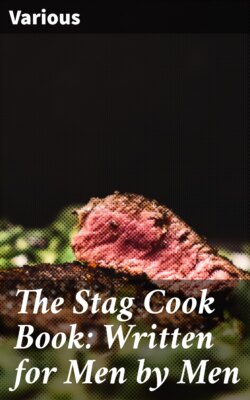Читать книгу The Stag Cook Book: Written for Men by Men - Various - Страница 3
INTRODUCTION
By Robert H. Davis
ОглавлениеCooking is a gift, not an art. Eating is an art, not a gift. In combination a grace is developed. No great culinary triumph was ever perfected by accident.
Charles Lamb’s essay on roast pig was responsible for a tidal wave of burnt pork that swept over England in the nineteenth century. Mr. Lamb led a hungry empire to the belief that only through an act of incendiarism could a suckling porker be converted into a delicacy; whereas, as a matter of fact, the perfection of roast pork, golden-brown and unseared by fire, were possible only in the oven.
Lucullus, the good Roman gourmet, had his meals cooked in a mint. He required that his masterpieces be served on gold and silver and crystal, and spread on a table of lapis lazuli. The sauces compiled for him were worth more than the food upon which they were poured. He was the high priest of extravagance and luxury. A single meal stood him a fortune. He had more regard for the cost than for the cooking. It is said that his death was hastened by dyspepsia.
In the early seventies a French nobleman, living in the neighborhood of Barbizon, was found seated at the table with his face in a plate of soup. Because of the fact that a butcher knife had been inserted via the back between his fourth and fifth rib on the left side, he was quite dead. Clues led nowhere. It became one of the mysteries.
Long afterward an old man tottered into the office of the Prefect and announced that he wished to make a confession.
“Proceed,” said the official.
“ ’Twas I,” responded the ancient, “who delivered the death stroke to the Duke de la—— thirty-five years ago.”
“What inspired you to make this confession?”
“Pride.”
“I do not comprehend. The details, if you please.”
“By profession I was a chef,” said the self-accused. “The Duke, at a fabulous price, enticed me into his service. His first request was that I make for him a perfect consomme. Voilà! For three days I prepared this perfection. With my own hand I placed before him the soup tureen. With my own hand I ladled it out. He inhaled its divine essence; and then, Your Honor, he reached for the salt. Mon Dieu! I destroy him!”
The Prefect embraced the artist and took him out to lunch. Thus art was vindicated and the incident closed. In the chemistry of cooking, “enough is too much.”
The immortals who have contributed recipes to this volume were born with a silver spoon not in their mouths, but in their hands. The cap and apron, not the cap and bells, is the garb in which they perform. Secrets handed down through generations are thrown with a wanton hand on the pages that comprise this volume. Sauces from the south, chowders from New England, barbecued masterpieces from the west, grilled classics from field and stream, ragouts, stews, desserts, dressings are hung within reach of all, like garlic clusters from the rafters of opportunity. Reach up and help yourself.
Be not disturbed by occasional jocund phrases in this symposium. Behind them is probably concealed a savory or a flavor. A long paragraph may conclude with full particulars concerning the architecture of a gastronomic dream. Turn the pages slowly lest you be overwhelmed by the richness of the menu.
The late King Edward, upon bidding the later Carlos of Portugal God-speed back to his native shores, inquired: “By what were you most impressed during your visit to the British Isles?”
“Roast beef,” said Carlos, expanding in ecstasy.
“And what else?” inquired Edward.
“Well,” said Carlos, “the boiled beef wasn’t so damned bad.”
It is one thing to cook food, and another to consume it. This inspired tome is the product of cooks who are not afraid to take their own medicine. The names of many of the dishes catalogued herein lies on the tongues of the mob, but the delicacies themselves do not. This book brings within the reach of all opportunities that up to now have been denied them. Given a first class stove, a few simple ingredients and a copy of this book, hunger can be abolished wherever English is read.
Rossini, the musician, also a chef, after writing the score of The Barber of Seville, was informed by the director that a prelude was required immediately. Rossini repaired to his kitchen, cooked himself a perfect dinner, consumed it alone, and went to bed where in a reclining position with score sheets all about him, he wrote a brilliant introduction to his brilliant opera. Suddenly a gust of wind entered unbidden at the window and scattered the precious sheets about the room. Several disappeared through the lattice. Rossini, heavy with the consequences of his culinary genius, re-wrote a fresher and better prelude, tucked it under his corpulent person and rolled over for a final nap, after which he hastened to the opera house with his masterpiece. His best work was done on a full stomach.
Brillat-Savarin, author of “Gastronomy as a Fine Art,” rather whimsically names “Gasteria” the tenth and fairest of the Muses. The writers of this book name her as the first.
R. H. D.
